 The frequencies 1781.7-1785MHz paired with 1876.7-1880MHz known as the GSM Guard bands have been made available to 12 licensees under the Wireless Telegraphy Act. They are national UK licenses, though the operators of the licenses will have to cooperate amongst themselves so that interference between themselves doesn’t occur. Ofcom expect the licensees to form an industry body that will self-regulate. Operators will also be required to register all radio equipment in the “Sitefinder” database (currently populated by the GSM and 3G operators).
The frequencies 1781.7-1785MHz paired with 1876.7-1880MHz known as the GSM Guard bands have been made available to 12 licensees under the Wireless Telegraphy Act. They are national UK licenses, though the operators of the licenses will have to cooperate amongst themselves so that interference between themselves doesn’t occur. Ofcom expect the licensees to form an industry body that will self-regulate. Operators will also be required to register all radio equipment in the “Sitefinder” database (currently populated by the GSM and 3G operators).
Even though the licenses are only low power (sub 200mW compared to 10’s of Watts for traditional GSM systems), they are suitable for services such as in-building GSM, local area GSM (such as in a theme-park) or other constrained areas. There are 15 GSM channels available, each one being able to carry 8 voice calls i.e. 120 voice calls in total. Having a reasonable number of channels will allow multiple operators to co-exist in an area and also allow single operators to cover larger areas (in such a way that multiple GSM basestations won’t interfere with each other).
Though it is expected the main use will be low power GSM, Ofcom have not specified what the licenses should be used for and as such, can be utilised for any service, such as localised wireless broadband, as long as the GSM spectral masks are adhered to (which will ensure interference doesn’t occur with the existing GSM operators).
 Winning Licensees
Winning Licensees
The 12 companies winning licenses and the prices they paid were: – (note all bids in GB pounds £)
| British Telecommunications PLC | 275,112 |
| Cable & Wireless UK ( England) | 51,002 |
| COLT Mobile Telecommunications Ltd | 1,513,218 |
| Cyberpress Ltd | 151,999 |
| FMS Solutions Ltd | 113,000 |
| Mapesbury Communications Ltd | 76,660 |
| O2 ( UK) Ltd | 209,888 |
| Opal Telecom Ltd | 155,555 |
| PLDT ( UK) Ltd | 88,889 |
| Shyam Telecom UK Ltd | 101,011 |
| Spring Mobil AB | 50,110 |
| Teleware PLC | 1,001,880 |
Ofcom published the complete matrix of bids as the award was for between 7 and 12 licenses. It was a close thing at 8 licenses as a few bidders put in high entries for low numbers of licenses and dropped the amount as the license numbers increased.
Ofcom arranged the auction in a sealed bid process in a “what you bid is what you pay” arrangement, which lead to the lowest price paid as £50,110 by Spring Mobil and the highest £1,513,218 by COLT (30x as much). Some have argued that the highest bidders paid over the odds, but they are putting a good spin on it saying that it’s in-line with their mobile strategy. The total amount of the licence fees paid was £3.8million, not bad for Ofcom’s first spectrum auction.
Of course, compared to the license fees paid for 3G spectrum (around £6bn per license) it’s peanuts.
A license, but what to do with it?
Having a license is all very well, but now licensees must be wondering what they’ve got themselves into. Just because they can run a GSM service doesn’t mean anyone will use it, in fact it may well be difficult to get people onto your network.
It’s extremely unlikely the existing mobile operators are going to want to have anything to do with these new upstarts, they’ve invested millions (err, billions) to get to where they are today. The last thing they want is new entrants poaching customers or moving users off their networks when they move into, say, an office environment. They especially don’t want their customers doing it with equipment (i.e. handsets) that they’ve heavily subsidised.
Unfortunately, what this means is that the new players are going to have to issue new SIMs (Subscriber Identity Modules) and they won’t work on existing GSM networks, or users will manually have to select the new network when they’re in range. This makes it all very difficult, and users won’t bother if it’s hard.
 New entrants could enter into roaming agreements with the current operators, but unless Ofcom mandates this (which is unlikely) there’s likely to be strong opposition. Since some of the license winners already have GSM networks, they can offer localised services knowing there’s no interference problems with existing infrastructure.
New entrants could enter into roaming agreements with the current operators, but unless Ofcom mandates this (which is unlikely) there’s likely to be strong opposition. Since some of the license winners already have GSM networks, they can offer localised services knowing there’s no interference problems with existing infrastructure.
Deals with foreign GSM operators?
One way ahead is for a licensee to make an agreement with a foreign operator and the localised network just becomes an extension of their foreign network, but then when users roam on to the network they’ll be subject to roaming charges which, as both Ofcom and the EU Government know too well, can mean very high charges for the end-user. If roaming charges do decline then this may well be a way forward.
There’s also a big potential opportunity for the Channel Islands GSM networks here, as they abide by UK numbering plans, so though they are considered “foreign”, their numbers look like UK numbers, including mobile ranges. They could offer roaming agreements and even offer SIMs which would still look like UK numbers.
So the future’s bright, but it will be an interesting few years to see if any of the new entrants can really pull anything off.
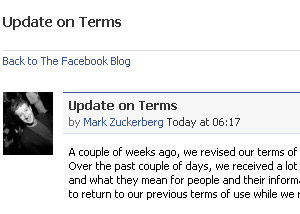 Brandishing virtual pitchforks, a user revolt against a new Terms of Service (TOS) agreement foisted on Facebook fans has seen the company perform a swift volte-face.
Brandishing virtual pitchforks, a user revolt against a new Terms of Service (TOS) agreement foisted on Facebook fans has seen the company perform a swift volte-face. The deal between Getty and Flickr, which exclusively gives Getty the right to pick the best images from Flickr and sell them via gettyimages.com to their customers in the creative, commercial and editorial industries — they call it the ‘first commercial licensing opportunity for photo-enthusiasts in the Flickr community’ — is, in many ways, inevitable.
The deal between Getty and Flickr, which exclusively gives Getty the right to pick the best images from Flickr and sell them via gettyimages.com to their customers in the creative, commercial and editorial industries — they call it the ‘first commercial licensing opportunity for photo-enthusiasts in the Flickr community’ — is, in many ways, inevitable.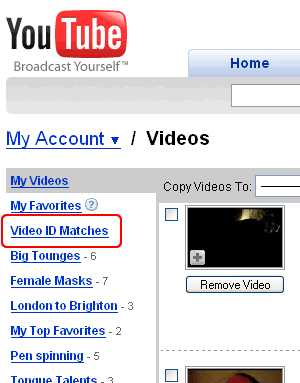 Always keen to stay on top of how content is being used and distributed, a few of us at DL have been playing around with the playlists and ‘channel’ building abilities of YouTube of late.
Always keen to stay on top of how content is being used and distributed, a few of us at DL have been playing around with the playlists and ‘channel’ building abilities of YouTube of late.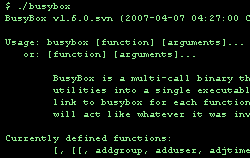 US company, Monsoon Multimedia is being taken to court for violating the terms of the open source NGU General Public License (GPL) of the BusyBox project.
US company, Monsoon Multimedia is being taken to court for violating the terms of the open source NGU General Public License (GPL) of the BusyBox project.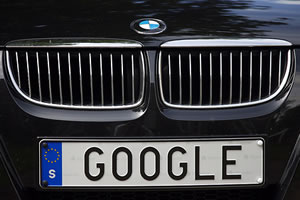 News reaches us from Helsingborg, on the gorgeous west coast of Sweden, that some sneaky chap has registered their car license plate as G O O G L E.
News reaches us from Helsingborg, on the gorgeous west coast of Sweden, that some sneaky chap has registered their car license plate as G O O G L E.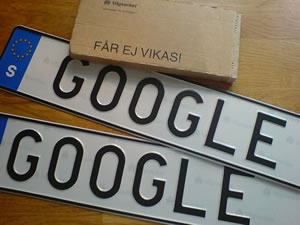 What’s Google reaction?
What’s Google reaction? Yesterday, record company giants EMI Group PLC announced that it planned to unveil “an exciting new digital offering” with Steve Jobs and the gang at Apple, leading pundits to conclude that The Beatles’ music catalogue is finally about to be made available through Apple’s iTunes online music store.
Yesterday, record company giants EMI Group PLC announced that it planned to unveil “an exciting new digital offering” with Steve Jobs and the gang at Apple, leading pundits to conclude that The Beatles’ music catalogue is finally about to be made available through Apple’s iTunes online music store. The Beatles have famously refused to sign up to iTunes and other online music services for years, and many expect the download charts to be instantly filled up with the Fab Four’s songs as soon as their catalogue becomes available.
The Beatles have famously refused to sign up to iTunes and other online music services for years, and many expect the download charts to be instantly filled up with the Fab Four’s songs as soon as their catalogue becomes available.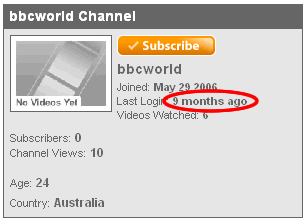 When an important deal like
When an important deal like 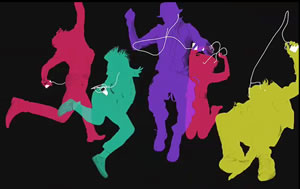 Norway has declared iTunes to be illegal because it doesn’t allow songs downloaded from the online music store to be played on any other equipment except their own, today’s FT reported.
Norway has declared iTunes to be illegal because it doesn’t allow songs downloaded from the online music store to be played on any other equipment except their own, today’s FT reported. The original complaint was made by Torgeir Waterhouse, senior advisor to the Norwegian Consumer Council. He told the FT that “he was in negotiations with pan_European consumer groups to present a unified position on iTunes’ legality.”
The original complaint was made by Torgeir Waterhouse, senior advisor to the Norwegian Consumer Council. He told the FT that “he was in negotiations with pan_European consumer groups to present a unified position on iTunes’ legality.” UK British music recording industry trade association, the BPi, has today issued a statement that they have “successfully jumped the first hurdle in its battle to have unauthorised Russian download site AllofMP3.com declared illegal.”
UK British music recording industry trade association, the BPi, has today issued a statement that they have “successfully jumped the first hurdle in its battle to have unauthorised Russian download site AllofMP3.com declared illegal.” The argument of the BPI is that AllofMP3 has no right to be selling the music, as they aren’t licensed to do so. AllofMP3 counter that they are “authorized by the license # LS-3М-05-03 of the Russian Multimedia and Internet Society (ROMS) and license # 006/3M-05 of the Rightholders Federation for Collective Copyright Management of Works Used Interactively (FAIR).”
The argument of the BPI is that AllofMP3 has no right to be selling the music, as they aren’t licensed to do so. AllofMP3 counter that they are “authorized by the license # LS-3М-05-03 of the Russian Multimedia and Internet Society (ROMS) and license # 006/3M-05 of the Rightholders Federation for Collective Copyright Management of Works Used Interactively (FAIR).” The frequencies 1781.7-1785MHz paired with 1876.7-1880MHz known as the GSM Guard bands have been made available to 12 licensees under the Wireless Telegraphy Act. They are national UK licenses, though the operators of the licenses will have to cooperate amongst themselves so that interference between themselves doesn’t occur. Ofcom expect the licensees to form an industry body that will self-regulate. Operators will also be required to register all radio equipment in the “Sitefinder” database (currently populated by the GSM and 3G operators).
The frequencies 1781.7-1785MHz paired with 1876.7-1880MHz known as the GSM Guard bands have been made available to 12 licensees under the Wireless Telegraphy Act. They are national UK licenses, though the operators of the licenses will have to cooperate amongst themselves so that interference between themselves doesn’t occur. Ofcom expect the licensees to form an industry body that will self-regulate. Operators will also be required to register all radio equipment in the “Sitefinder” database (currently populated by the GSM and 3G operators). Winning Licensees
Winning Licensees New entrants could enter into roaming agreements with the current operators, but unless Ofcom mandates this (which is unlikely) there’s likely to be strong opposition. Since some of the license winners already have GSM networks, they can offer localised services knowing there’s no interference problems with existing infrastructure.
New entrants could enter into roaming agreements with the current operators, but unless Ofcom mandates this (which is unlikely) there’s likely to be strong opposition. Since some of the license winners already have GSM networks, they can offer localised services knowing there’s no interference problems with existing infrastructure.